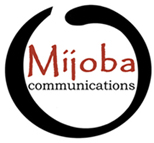The
goal of Mijoba Communications is to maximize the potential for
success of your organization through minimizing problems due to
inefficient communication. While there are many barriers to cross-cultural
communication, the timely and effective use of properly trained
interpreters and/or translators is an important step in the communication
process.
What
does an interpreter/translator do?
To
explain what interpreters and/or translators do, it is important
to understand the differences between interpreting and translation.
 Interpreting
vs. Translation--The primary difference between interpreting
and translation is that the interpreter translates orally, while
a translator interprets written text. Both interpreting and translation
presuppose a deep knowledge of more than one language. However,
the differences in the training, skills, and talents needed for
each job are vast. The key skill of a good translator is the ability
to write well and to express him/herself clearly in the target
language. The key skills of the translator are the ability to
understand the source language and the culture of the country
where the text originated, and, using a good library of dictionaries
and reference materials, render that material into the target
language.
Interpreting
vs. Translation--The primary difference between interpreting
and translation is that the interpreter translates orally, while
a translator interprets written text. Both interpreting and translation
presuppose a deep knowledge of more than one language. However,
the differences in the training, skills, and talents needed for
each job are vast. The key skill of a good translator is the ability
to write well and to express him/herself clearly in the target
language. The key skills of the translator are the ability to
understand the source language and the culture of the country
where the text originated, and, using a good library of dictionaries
and reference materials, render that material into the target
language.
 Forms
of interpreting: An interpreter has to be able to translate
in both linguistic directions immediately without the use of any
dictionaries. There are two types of interpreting: consecutive
and simultaneous. Simultaneous interpreting is when the interpreter
needs to be translating the sentence into the target language
while simultaneously listening to and comprehending the next sentence.
One of the key skills of the simultaneous interpreter is decisiveness:
there is simply no time to weigh the merits of variant translations
or to recall just the right idiom in the target language.
Forms
of interpreting: An interpreter has to be able to translate
in both linguistic directions immediately without the use of any
dictionaries. There are two types of interpreting: consecutive
and simultaneous. Simultaneous interpreting is when the interpreter
needs to be translating the sentence into the target language
while simultaneously listening to and comprehending the next sentence.
One of the key skills of the simultaneous interpreter is decisiveness:
there is simply no time to weigh the merits of variant translations
or to recall just the right idiom in the target language.
During
consecutive interpreting the speaker stops every 1-5 minutes and
the interpreter then steps in to render what was said into the
target language.
Interpreting
or translating is not a matter of substituting words in one language
for words in another. It is a matter of understanding the thought
expressed in one language and then explaining it using the resources
of another language. In other words, what an interpreter does
is change words into meaning, and then change meaning back into
words -- of a different language. This is why Mijoba Communications
makes sure that its contracted interpreters and translators are
knowledgeable in the subject matter of the assignment they are
interpreting for and, just as important, making sure that s/he
is an experienced interpreter.


